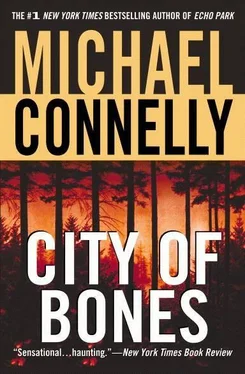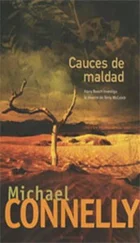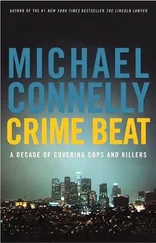“Dr. Guyot. How are you?”
“Better than you, I’m afraid. You’ve hurt yourself again. That looks like a nasty laceration.”
Bosch touched his cheek. It still stung.
“It’s all right. Just a scratch. You better keep Calamity on the leash. I just saw a coyote up there.”
“Yes, I never take her off the leash at night. The hills are full of roaming coyotes. We hear them at night. You better come with me to the house. I can butterfly that. If you don’t do it right it will scar.”
A memory of Julia Brasher asking about his scars suddenly came into Bosch’s mind. He looked at Guyot.
“Okay.”
They left the car on the circle and walked down to Guyot’s house. In the back office Bosch sat on the desk while the doctor cleaned the cut on his cheek and then used two butterfly bandages to close it.
“I think you’ll recover,” Guyot said as he closed his first-aid kit. “I don’t know if your shirt will, though.”
Bosch looked down at his T-shirt. It was stained with his blood at the bottom.
“Thanks for fixing me up, Doc. How long do I have to leave these things on?”
“Few days. If you can stand it.”
Bosch gently touched his cheek. It was swelling slightly but the wound was no longer stinging. Guyot turned from his first-aid kit and looked at him and Bosch knew he wanted to say something. He guessed he was going to ask about the dummy.
“What is it, Doctor?”
“The officer that was here that first night. The woman. She was the one who got killed?”
Bosch nodded.
“Yes, that was her.”
Guyot shook his head in genuine sadness. He slowly stepped around the desk and sank into the chair.
“It’s funny sometimes how things go,” he said. “Chain reaction. Mr. Trent across the street. That officer. All because a dog fetched a bone. A most natural thing to do.”
All Bosch could do was nod. He started tucking in his shirt to see if it would hide the part with blood stains.
Guyot looked down at his dog, who was lying in the spot next to the desk chair.
“I wish that I’d never taken her off that leash,” he said. “I really do.”
Bosch slid off the desk and stood up. He looked down at his midsection. The blood stain could not be seen but it didn’t matter because the shirt was stained with his sweat.
“I don’t know about that, Dr. Guyot,” he said. “I think if you start thinking that way, then you’ll never be able to come out your door again.”
They looked at each other and exchanged nods. Bosch pointed to his cheek.
“Thanks for this,” he said. “I can find my way out.”
He turned toward the door. Guyot stopped him.
“On television there was a commercial for the news. They said the police announced an arrest in the case. I was going to watch it at eleven.”
Bosch looked back at him from the doorway.
“Don’t believe everything you see on TV.”
THE phone rang just as Bosch had finished watching the first session of Samuel Delacroix’s confession. He picked up the remote and muted the sound on his television and then answered the call. It was Lieutenant Billets.
“I thought you were going to call me.”
Bosch took a pull from the bottle of beer he was holding and put it down on the table next to his television chair.
“Sorry, I forgot.”
“Still feeling the same way about things?”
“More so.”
“Well, what is it, Harry? I don’t think I’ve ever seen a detective more upset about a confession before.”
“It’s a lot of things. Something’s going on.”
“What do you mean?”
“I mean I’m beginning to think that maybe he didn’t do it. That maybe he’s setting something up and I don’t know what.”
Billets was quiet a long moment, probably not sure how to respond.
“What does Jerry think?” she finally asked.
“I don’t know what he thinks. He’s happy to clear the case.”
“We all are, Harry. But not if he’s not the guy. Do you have anything concrete? Anything to back up these doubts you are having?”
Bosch gently touched his cheek. The swelling had gone down but the wound itself was sore to the touch. He couldn’t stop himself from touching it.
“I went up to the crime scene tonight. With a dummy from SID. Seventy pounds. I got it up there but it was a hell of a fight.”
“Okay, so you proved it could be done. Where’s the problem?”
“I hauled a dummy up there. This guy was dragging his dead son’s body. I was straight; Delacroix says he was looped. I had been up there before; he hadn’t. I don’t think he could’ve done it. At least not alone.”
“You think he had help? The daughter maybe?”
“Maybe he had help and maybe he was never there. I don’t know. We talked to the daughter tonight and she won’t come across on the father. Won’t say a word. So you start to think, maybe it was the two of them. But then, no. If she was involved, why would she call us and give us the ID on the bones? Doesn’t make sense.”
Billets didn’t respond. Bosch looked at his watch and saw it was eleven o’clock. He wanted to watch the news. He used the remote to turn off the VCR and put the TV on Channel 4.
“You got the news on?” he asked Billets.
“Yes. Four.”
It was the lead story-father kills son and then buries the body, arrested twenty-some years later because of a dog. A perfect L.A. story. Bosch watched silently and so did Billets on her end. The report by Judy Surtain had no inaccuracies that Bosch picked up on. He was surprised.
“Not bad,” he said when it was over. “They finally get it right.”
He muted the television again just as the anchor segued to the next story. He was silent for a moment as he watched the television. The story was about the human bones found at the La Brea Tar Pits. Golliher was shown at a press conference, standing in front of a cluster of microphones.
“Harry, come on,” Billets said. “What else is bugging you? There’s got to be more than just your feeling that he couldn’t have done it. And as far as the daughter goes, it doesn’t bug me that she made the call with the ID. She saw it on the news, right? The story about Trent. Maybe she thought she could just pin it on Trent. After twenty years of worrying, she had a way to put it on somebody else.”
Bosch shook his head, though he knew she could not see this. He just didn’t think Sheila would call the tip line if she had been involved in her brother’s death.
“I don’t know,” he said. “It doesn’t really work for me.”
“Then what are you going to do?”
“I’m going through everything now. I’ll start over.”
“When’s the arraignment, tomorrow?”
“Yup.”
“You don’t have enough time, Harry.”
“I know. But I’m doing it. I already picked up a contradiction I didn’t see before.”
“What?”
“Delacroix said he killed Arthur in the morning after he discovered the boy hadn’t gone to school. When we interviewed the daughter the first time, she said Arthur didn’t come home from school. There’s a difference there.”
Billets made a chortling sound in the phone.
“Harry, that’s minor. It’s been more than twenty years and he’s a drunk. I assume you are going to check the school’s records?”
“Tomorrow.”
“Then you get it ironed out then. But how would the sister know for sure whether he went to school or not? All she knows is that he wasn’t home afterward. You’re not convincing me of anything.”
“I know. I’m not trying to. I’m just telling you about the things I’m looking at.”
“Did you guys find anything when you searched his trailer?”
Читать дальше












